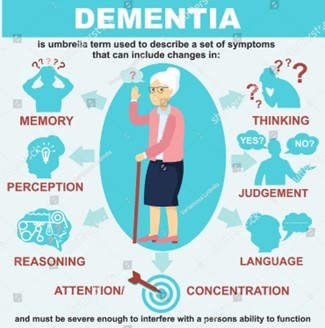A nurse is caring for a client who has dementia. Which of the following findings should the nurse expect?
Memory loss that disrupts ADLs
Catatonia
Illusions
Pressured speech
The Correct Answer is A
Dementia is a condition characterized by a decline in cognitive function that affects a person's ability to perform activities of daily living (ADLs). Memory loss is a common symptom of dementia, particularly in the early stages. Memory loss can disrupt a person's ability to carry out tasks they were previously able to do independently, such as dressing, bathing, and eating. Therefore, option A is the correct answer.
Option b, catatonia, is a condition characterized by a lack of movement or activity, which is not typically associated with dementia.
Option c, illusions, involve a misinterpretation of sensory information and may occur in some forms of dementia but are not a defining feature.
Option d, pressured speech, is a symptom commonly associated with mania or bipolar disorder but is not typically seen in dementia.

Nursing Test Bank
Naxlex Comprehensive Predictor Exams
Related Questions
Correct Answer is C
Explanation
Timolol is a beta-blocker medication that is commonly prescribed for the treatment of glaucoma. It works by reducing the production of aqueous humor in the eye, thereby decreasing intraocular pressure. However, timolol can also be systemically absorbed, which may lead to cardiovascular side effects.
Checking the heart rate while taking timolol is important because beta-blockers can potentially lower heart rate and blood pressure. It is essential to monitor for any changes in heart rate or any other cardiovascular symptoms while using timolol eye drops.
Correct Answer is A
Explanation
Radiation therapy can cause increased sensitivity and dryness in the skin. Exposing the neck to cold temperatures may exacerbate these symptoms and potentially lead to discomfort or skin damage. Encourage the client to keep the neck covered and warm, especially when going outside in cold weather.
While proper nutrition is important during radiation therapy, the specific instruction to eat three large meals each day is not necessarily applicable or beneficial. It is generally recommended to have a balanced and nutritious diet, which may include smaller, frequent meals or snacks if the client's appetite is affected.
During radiation therapy, the skin in the treatment area can become sensitive and prone to irritation. Rubbing the neck vigorously with a washcloth can further irritate the skin. Instead, advise the client to gently cleanse the neck using a mild, non-irritating soap and patting the skin dry with a soft towel.
While radiation therapy can cause certain side effects, such as dry mouth or difficulty swallowing, it is generally not necessary to restrict fluid intake unless specifically advised by the healthcare provider. Adequate hydration is important for overall health and well-being, and the client should be encouraged to drink enough fluids unless instructed otherwise.
Whether you are a student looking to ace your exams or a practicing nurse seeking to enhance your expertise , our nursing education contents will empower you with the confidence and competence to make a difference in the lives of patients and become a respected leader in the healthcare field.
Visit Naxlex, invest in your future and unlock endless possibilities with our unparalleled nursing education contents today
Report Wrong Answer on the Current Question
Do you disagree with the answer? If yes, what is your expected answer? Explain.
Kindly be descriptive with the issue you are facing.
